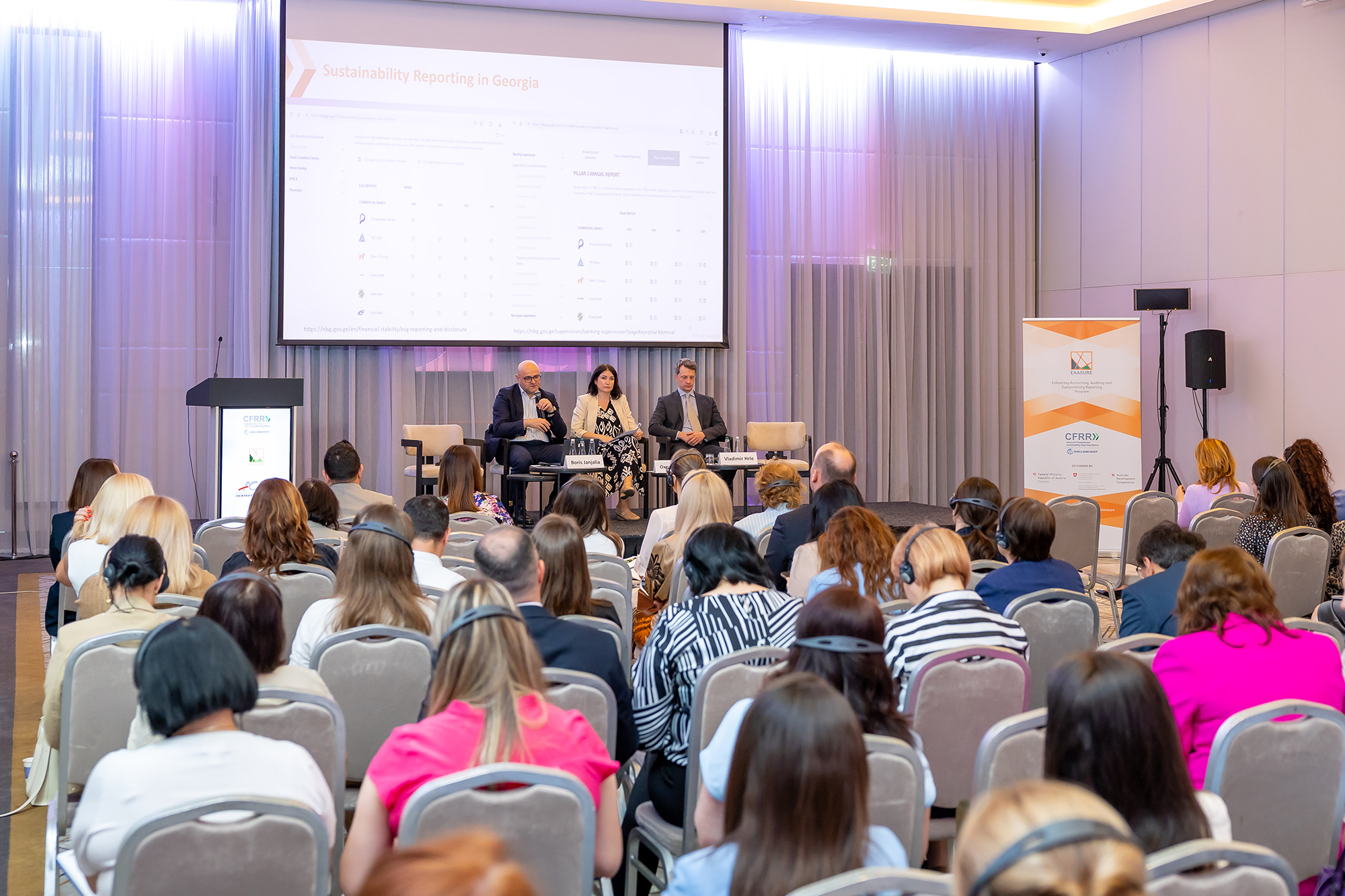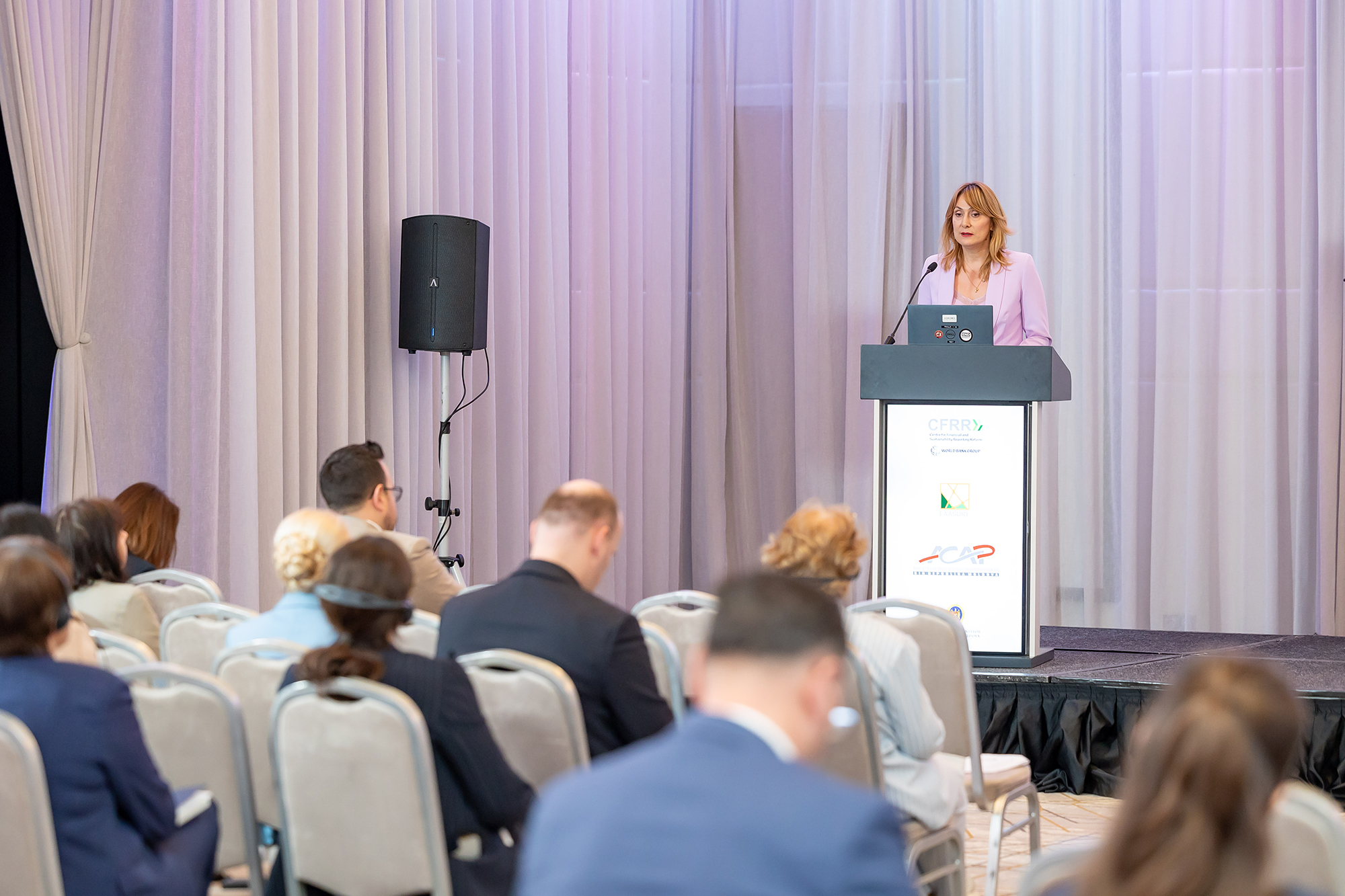A Conference “Navigating Sustainability Reporting: European Union (EU) Requirements and Moldovan Integration” was held on June 03, 2025, in Chisinau, Moldova as part of the regional program Enhancing Accounting, Auditing, and Sustainability Reporting Program (EAASURE), co-funded by the Austrian Ministry of Finance, the Swiss State Secretariat for Economic Affairs (SECO), and the Austrian Development Cooperation (ADA).
The Conference was organized by the CFRR in cooperation with the Ministry of Finance of the Republic of Moldova and the Association of Professional Accountants and Auditors of the Republic of Moldova.
The Conference convened 104 participants, including representatives of businesses, regulators, and accounting professionals. The keynote speech delivered by EFRAG set the tone for the event, that aimed to foster a comprehensive understanding of upcoming EU sustainability reporting requirements, crucial for the Republic of Moldova’s economic future and seamless integration into the evolving regulatory landscape.
Discussions covered current Corporate Sustainability Reporting Directive (CSRD) and European Sustainability Reporting Standards (ESRS) provisions, expected changes from the Omnibus Directive, strategies for corporate transition to mandatory frameworks, and the vital role of corporate governance bodies in ensuring reliable sustainability information. Incentives for robust non-financial reporting practices were also explored. The concept of "double materiality"—assessing both financial impact from environmental, social, and governance factors and an entity's own impact on society and environment—was presented as a fundamental shift in performance evaluation. This strategic embrace of non-financial reporting is vital for the Republic of Moldova's economic future and European integration, bolstering competitiveness, enhancing trust, and attracting crucial sustainability-focused international investment.
The Conference effectively charted the Republic of Moldova’s course for engaging with EU sustainability requirements. It underscored that proactive preparation and a phased implementation are crucial for seamless integration, emphasizing that robust corporate governance and embedding sustainability into core business strategies are pivotal for effective reporting.
Participants welcomed the Conference as a timely and valuable forum for dialogue. Cristina Tiscul, Gender Expert at the Economic Council to the Prime Minister, stated “The adoption of non-financial reporting represents a natural progression in the Republic of Moldova's commitment to its European integration path.” Ana Groza, Executive Director of the Foreign Investors Association, said that the event provided “a valuable framework for dialogue and alignment…at a crucial moment for the Republic of Moldova's economy,” believing that "implementation of European reporting standards would show the Republic of Moldova's clear commitment to sustainability and transparency, which would attract investors." Dorel Noroc, President of the Association of Banks of the Republic of Moldova, found the event highly beneficial, especially the “practical cases, both local and international,” which were a “big plus” for addressing implementation challenges.Valeria Iordatii, Chief of Accounting regulation section at the National Bank of the Republic of Moldova, identified the most valuable aspect as the “clarification of the interdependence between sustainability reporting requirements and the strategic transformation of entities,” adding that “exchange of best practices and dialogue with international experts contributed to a deep understanding of the double materiality principle.”
A significant announcement during the Conference was the upcoming launch of the Best Annual Report and Transparency Award (BARTA) by the Ministry of Finance with support from EAASURE. Inspired by a successful initiative in Georgia, BARTA aims to encourage companies to adopt and maintain robust non-financial reporting practices and enhance the overall quality of annual reports and transparency in the Republic of Moldova's market.
Participants generally expressed strong positive feedback, highlighting the conference as a timely and valuable platform for essential dialogue and alignment on critical sustainability reporting issues in Moldova. Attendees particularly appreciated the comprehensive discussions that brought together a diverse group of stakeholders from regulatory bodies, the accounting profession, and the private sector, contributing to better and more widespread understandings of the CSRD and ESRS. A consistently noted valuable aspect was the clarification of the intricate link between sustainability reporting requirements and the strategic transformation necessary for entities. For many participants, the exchange of good practices and dialogue with international experts contributed significantly to a deep understanding of the double materiality principle as a central pillar, representing a paradigm shift in how entities should view performance. The inclusion of practical local and international cases was also highly commended, providing tangible insights for navigating the transition to new reporting standards.
While acknowledging existing challenges, such as the lack of a clear normative framework or guidelines, limited data collection capabilities, and varying levels of preparedness among stakeholders, participants agreed that events like this Conference were instrumental in addressing these hurdles. The insights gained are expected to be highly useful for the effective application of relevant legislation and for facilitating a coherent transition towards European sustainability reporting requirements and standards. The overall sentiment was one of optimism and a clear recognition of the transformative potential of these reforms for Moldova's sustainable development.



















